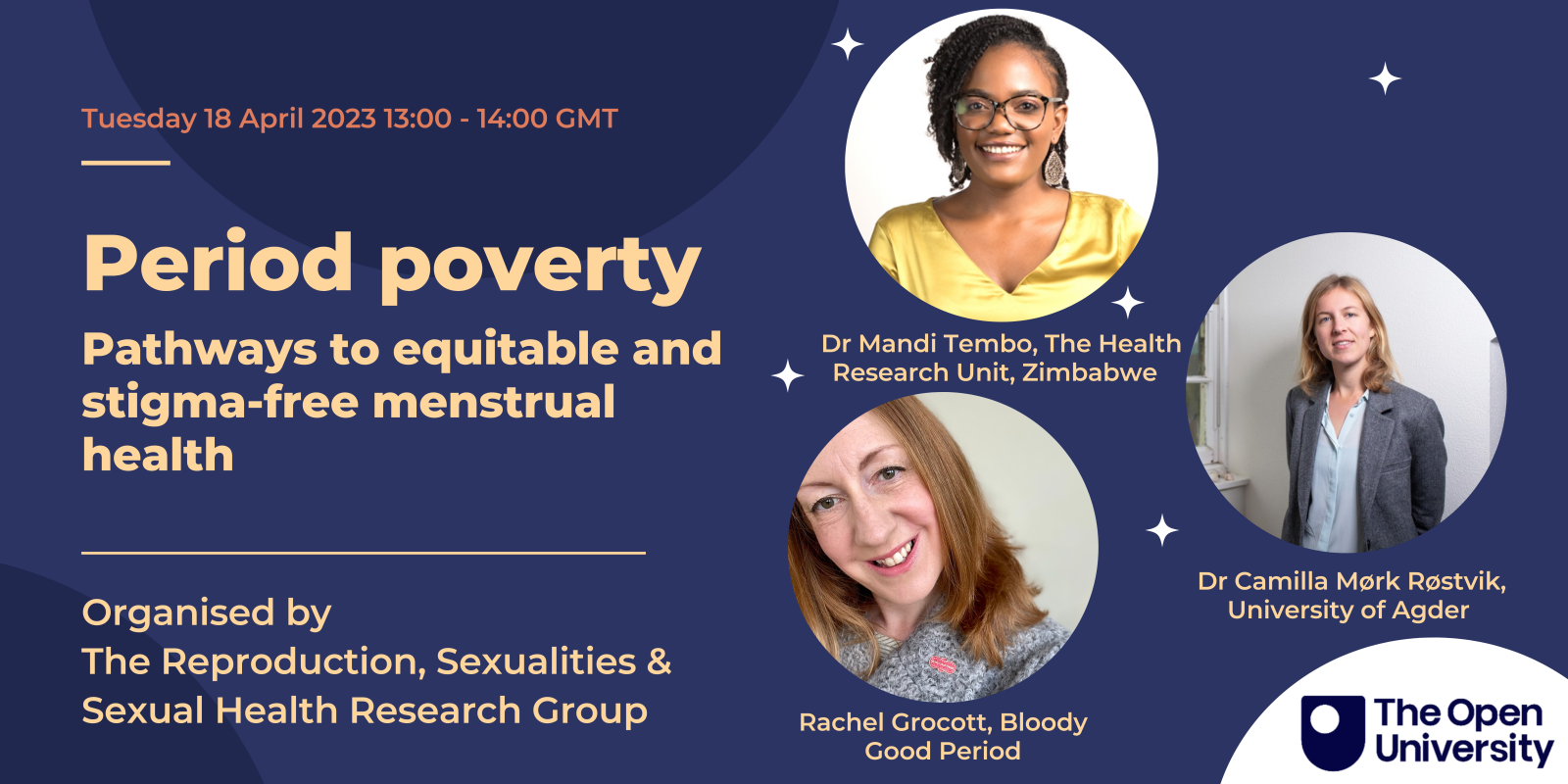You are here
- Home
- RSSH Seminar Series: Period poverty - pathways to equitable and stigma-free menstrual health
RSSH Seminar Series: Period poverty - pathways to equitable and stigma-free menstrual health
- Dates
- Tuesday, April 18, 2023 - 13:00 to 14:00
- Location
- Online
- ContactMartha Nicholson
What is needed to end period poverty and ensure that everyone who menstruates experiences affordable, dignified and stigma-free periods?
Research shows that periods are an everyday stressor for many, made worse by the costs, pain and unpredictability of periods. Accessing affordable period products is not easy for all, in fact almost a quarter of people who menstruate who responded to a UK survey last year said they struggle to pay for period products. The cost of period products is especially challenging to manage for people living in poverty and who are living as refugees or asylum seekers. Everyone benefits when people who menstruate do not suffer from embarrassment and shame, and can access period products whenever needed. So what can academics, campaigners and practitioners doing to shine a light on period poverty? And what can we all do end a culture of period stigma and silence?
In this seminar, the speakers will discuss their activism and research with and for people affected by period poverty. Join for this live event on 18 April to hear the conversation first and put your questions to the panel, or listen to the podcast via The RSSH Podcast series on Spotify or wherever you get your podcasts.
Speakers: Rachel Grocott, Dr Mandi Tembo and Dr Camilla Mørk Røstvik
Rachel Grocott (she/her) - After 15 years of experience in communications, fundraising and leadership roles in charities both tiny and huge, Rachel joined Bloody Good Period (BGP) in 2018. Her role has grown from day-to-day social media management, to directing all public fundraising and communications for the small, groundbreaking charity, to stepping into the CEO role in 2022.
Rachel has played a key role in strengthening BGP’s profile and reputation, especially through the Covid pandemic (because periods don’t stop in a pandemic), and now as the cost of living crisis creates record levels of demand for the charity's work. She particularly relishes leveraging and developing the powerful Bloody Good brand to tackle period shame, garner support and get period products to those who otherwise wouldn’t be able to access them. The charity is calling for menstruation and menstrual equity to be factored into support for the most vulnerable, into health provision, workplaces, and all parts of our society, so that no-one is held back by their period.
Dr Mandi Tembo (she/her) - Dr Tembo (PhD) is a public health specialist with a research focus on menstrual health, adolescent sexual and reproductive health service delivery, and public engagement. Currently, she is a Reckitt Global Hygiene Institute post-doctoral fellow leading an innovative project focusing on women and menstruation across the life-course and on the co-creation of a menstrual health toolkit with women, healthcare providers, and other relevant stakeholders in rural and urban communities across Zimbabwe. She is also the public engagement lead for The Health Research Unit Zimbabwe (THRU ZIM) and is involved in several public engagement research projects across Zimbabwe including the Youth Researchers Academy (YRA) and the Art of Health. She holds a PhD (Epidemiology) from the London School of Hygiene and Tropical Medicine, an MSc in Global Health and Development from UCL and a BA in Public Health and Women's Gender Studies.
Dr Camilla Mørk Røstvik (she/her) - Dr Mørk Røstvik is Associate Professor in History at the University of Agder. She is Honorary Research Fellow at the School of Art History at the University of St Andrews, and Honorary Lecturer in the School of Medicine at the University of Aberdeen. Camilla leads the Wellcome Trust funded Menstruation Research Network UK (2022-2025) and led the Scottish Government funded project Arctic Periods: Transnational Knowledge about Menstrual History (2021-22). She is Co-PI on the Royal Society of Edinburgh funded 'Ending Period Poverty in Scotland' research project (2020-2022), and was PI on the Wellcome Trust funded Menstruation Research Network UK (2019-2020).
Facilitator: Victoria Newton (she/her)
Dr Victoria Newton is a Senior Research Fellow in the School of Health, Wellbeing and Social Care at the Open University. Victoria’s research focuses on reproductive health – contraception, abortion, menstruation and fertility. Victoria coordinates the Reproduction, Sexualities & Sexual Health Research Group within the School. She specialises in qualitative research, with a focus on sensitive subjects, and has worked in reproductive health since undertaking her PhD at the University of Sheffield. Her PhD was funded by the AHRC and explored ‘folklore’ and everyday knowledge and belief about menstruation.
